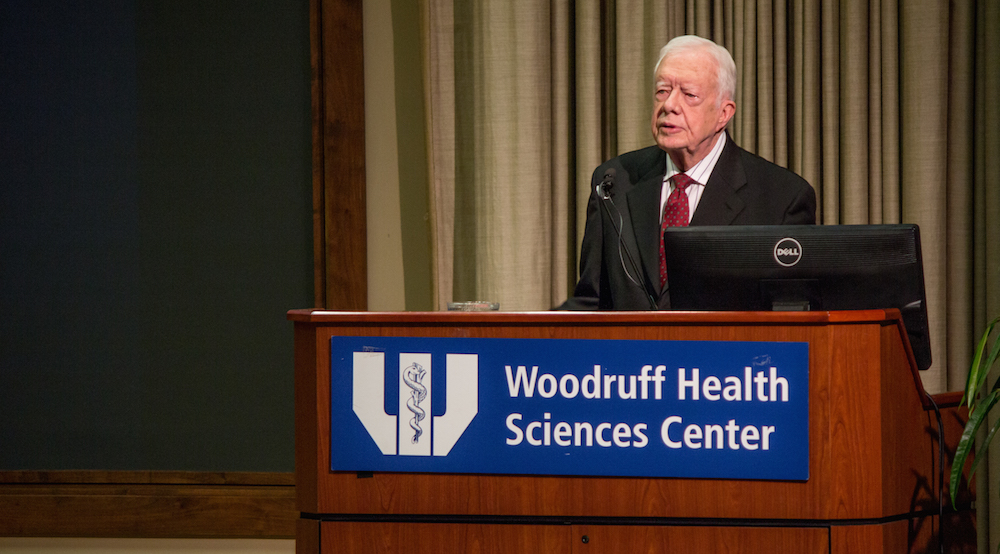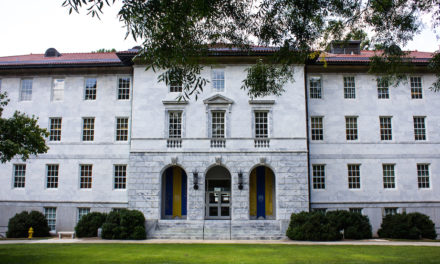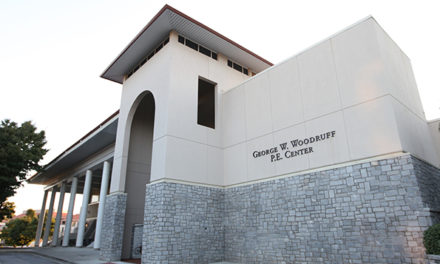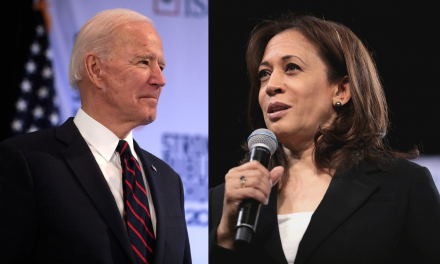
Former President Jimmy Carter gave a lecture on the Carter Center’s work in Liberia in the Woodruff Health Sciences Center Administration Building auditorium on Thursday. | Photo by Hagar Elsayed
Former President Jimmy Carter reflected on the successes of the Atlanta-based Carter Center’s work in Liberia throughout the Ebola crisis and lauded Emory’s treatment of those infected with the virus at the Woodruff Health Sciences Center Administration Building auditorium on Thursday afternoon.
Around 200 students, faculty and visitors from outside the University and the U.S. filled the auditorium to capacity as the nation’s 39th president stepped up to the podium for a talk titled “Ebola, Democracy, Human Rights and Public Health,” the sixth installment of a semester-long series of University discussions and panels looking back at the height of the 2014 Ebola crisis.
Before launching into the Carter Center’s past of focusing on tropical disease prevention in sub-Saharan Africa, Carter recalled his first visit to Liberia in 1978 and emphasized the importance of the nation, due to its ties with the United States.
“As all of you probably know, Liberia is the closest country in Africa to the United States,” he said, briefly summarizing the nation’s establishment by U.S. citizens as a colony for freed African American slaves and its subsequent independence.
He recalled the Carter Center’s multiple delegations to Liberia throughout the 1990s, when the organization assisted in negotiations during the country’s first civil war, held discussions on democracy and launched human rights and media programs. Still, he said, the Center’s main focus lay outside of politics.
“The primary goal of the Carter Center … is in health care,” he said, describing the Center’s educating Liberians on how to avoid contracting and spreading tropical diseases like Dracunculiasis, or guinea worm disease, which can be contracted through unclean drinking water. “We’ve been doing this for a long time — 30 years now in fact.”
“[Tropical diseases] are not always addressed by the public health system, because sometimes [public health officials] don’t even know they exist,” Carter said, calling Ebola a “neglected tropical disease.”
When the outbreak began in March 2014 and other organizations were slow to respond, he said, the Carter Center’s involvement in Liberia proved an advantage.
“[Ebola] was basically ignored by the World Health Organization [WHO], the Centers for Disease Control and Prevention [CDC], the local health organizations — it was ignored,” Carter said.
But by that time, the Center had already begun training nurses for a mental health program in the country led by his wife, Rosalynn, he said.
“By the time March 2014 came along, 144 nurses had already been trained, so we decided to train them for Ebola treatment,” Carter said. He added that, along with two other public health programs in Liberia, the Carter Center was well prepared for the crisis last year, and “it was natural that we gave our attention to the problem of Ebola in Liberia.”
Still, he noted that the WHO and the CDC had not declared the outbreak an emergency until late in the summer of 2014.
Throughout the lecture and ensuing question and answer session, Carter emphasized the importance of educating the citizens of affected countries, a key strategy of the Carter Center’s workers.
He described informing the locals of the importance of staying away from the bodies of those who had died of Ebola as one example of a major challenge in this area.
“They had always revered the bodies of the deceased, so to have the bodies disposed of, when they were normally touched or even kissed — that was a shock to them,” he said.
When teaching Liberian citizens about guinea worm, he recalled, the Carter Center workers faced many obstacles.
“How do you teach people who can’t read and write, who don’t have radio or TV, what to do about guinea worm?” he asked. The answer: the organization workers drew cartoons of women drawing from pools. Those who strained the water for guinea worm eggs were shown healthy at the bottom of the cartoon. Those who didn’t strain the water were shown suffering the grotesque consequence of the disease — a guinea worm emerging from the person’s skin.
Carter also cited the Liberians’ trust in the Carter Center workers — despite their mistrust in the country’s government — as an advantage in the organization’s efforts to educate them.
“It was obvious to us that no one believed the directions and instructions that came out of Monrovia, and that’s why we had to inform them,” Carter said. “We were the first ones who went into the [country’s] interior during [the] civil war. We were the first ones to have the elections. We had the confidence of the people.”
Ellen Johnson Sirleaf, current president of Liberia, “invited the Carter Center to come in even before the Ebola crisis really got started,” according to Carter.
“We’ve never been experts on Ebola, we’ve never treated anyone with Ebola, but when our specialists came in, the people listened,” he said.
When discussing the United States’ response to the outbreak, Carter said “we handled it very poorly here — except at Emory.”
He also recognized Liberian nursing student Fatu Kekula, who sat in the front row, for her work in saving the lives of three family members afflicted with the virus before enrolling at the Nell Hodgson Woodruff School of Nursing this spring.
After the talk — which was sponsored by the Institute of African Studies, the Institute for Developing Nations and the School of Nursing — Kekula said she thought Carter “addressed all of the crises” but wished he had explained ways to address Liberia’s infrastructural needs in more detail. She specifically said she had hoped Carter would touch on ways to improve Liberia’s education system, health system, health facilities construction and the health education for communities and professional health workers.
Jessica Frye, a first-year Laney Graduate School student who attended the talk, said she thought seeing Carter speak was ”amazing” and “a great opportunity,” though she added that she wished Kekula had been able to voice her experiences.
“If she would’ve spoken, it would have been more important,” Frye said. “What [Carter] did was great and everything, but I would really have liked to hear [Kekula’s] perspective.”
A College senior studying economics and French, Lydia O’Neal has written for The Morning Call, The Philadelphia Inquirer, Consumer Reports Magazine and USA Today College. She began writing for the News section during her freshman year and began illustrating for the Wheel in the spring of her junior year. Lydia is studying in Paris for the fall 2015 semester.






